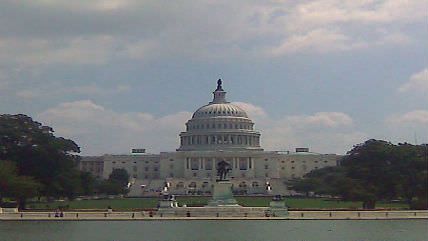Regions With High Federal Government Employment Are Not Economically Better, Have An Innovation Deficit

Richard Florida, urban studies theorist and Editor of the Atlantic Cities, examined federal government job levels in U.S. metro areas and determined that that there is no correlation between a region's share of federal jobs and economic success. He also found a negative correlation between federal government job levels and innovation.

The study was part of his ongoing series documenting the varying characteristics of American cities. In a previous article, Florida mapped out the prevalence of different employment sectors in the nation's capitol. In this study, he asked labor market data and research firm EMSI to measure which metro areas have the highest and lowest shares of federal government jobs across the U.S., and then his colleague ran a simple correlation analysis to determine the relationship between the job levels with several economic indicators.
First, Florida found that many of the metro areas with the highest federal government employment are in the "gunbelt"—those regions heavily reliant on military bases. For instance, when accounting for both direct and indirect federal employment, Honolulu, Hawaii and the Virginia-North Carolina region actually surpass Washington D.C. with 43% and 42% of the population working for the federal government versus a relatively small 36%. Maps of the data can be found here.
When Florida's colleague measured how well these federal government-heavy regions compare to the rest of the country's metro areas, she came away with two major findings:
Strikingly, there was no correlation at all between share of federal jobs and a wide range of economic indicators, including economic output per capita, the share of professional, knowledge and creative workers, or the share of college grads. Even more remarkably, we found a negative correlation between federal government job levels and innovation (-.26, as measured by patents per capita).
She also found that "America's leading high-tech centers, in Silicon Valley and the San Francisco Bay area, Boston-Cambridge, and the Research Triangle, have relatively low shares of direct federal employment."
What does this mean? Keeping in mind that the data just measures correlations, not causation, and that Florida does not offer any theories to explain the data, one could postulate that federal employment does not stimulate the economy any more so than the private sector. Additionally, given that data shows federal employees get paid more for the same work than their private sector counterparts, the effect may move in the opposite direction.
In regards to innovation, the implications seem clearer; particularly in light of the fact that the regions responsible for driving the new knowledge economy have the least federal employment. Some social scientists however, have criticized Florida's use of patents per capita as an ineffective way to measure the elusive concept. It is not unprecendented though: the OECD also uses patents per capita to measure innovation levels among member countries.
Editor's Note: As of February 29, 2024, commenting privileges on reason.com posts are limited to Reason Plus subscribers. Past commenters are grandfathered in for a temporary period. Subscribe here to preserve your ability to comment. Your Reason Plus subscription also gives you an ad-free version of reason.com, along with full access to the digital edition and archives of Reason magazine. We request that comments be civil and on-topic. We do not moderate or assume any responsibility for comments, which are owned by the readers who post them. Comments do not represent the views of reason.com or Reason Foundation. We reserve the right to delete any comment and ban commenters for any reason at any time. Comments may only be edited within 5 minutes of posting. Report abuses.
Please to post comments


Are the most bullshit professions there are. And I'm speaking as someone who works in both categories - IT and Professional Writing. IT mainly exists because people are willfully ignorant about technology. I have heard people who have shown the capacity to learn exclaim "I don't know anything about computers" and refuse to use the previously demonstated capacity. While I herd my UNIX Boxen, I'm cognizent of how easy it has become over the past decade. I'm bored at work because anyone can do my job. Unless, of course they "don't know anything about computers".
And the only loss suffered from the vanishment of "creative workers" would be less entertainment. From a functional standpoint, we have no purpose.
Not according to Florida. Those are the only workers that really matter.
His whole Creative Class theory is pretty much bullshit from start to finish, but it makes the literati who consume his work feel superior, so it continues to get traction with the "right" people.
Creative workers does not mean entertainment. Creative workers design automobiles, design office towers, build prosthetic limbs, etc. Think outside the box, dude.
Those aren't 'creative', those are engineering workers. Creative putz are bullshit artists.
Florida defines "creative" differently than you or I might. EDG is closer to the theoretical definition that Florida uses.
It's a stupid theory, but he included pretty much most white collar and ivory tower types in the creative class so that no one important would look behind the curtain. He lumped all academics into his "super creative core", that should tell you something about the extent to which he's just a navel-gazing idiot.
capital. A capitol is a building, capital a city.
relationship between X with Y; no; relationship between X and Y, yes.
the ... regions
any more than
effect may be in
in regard to